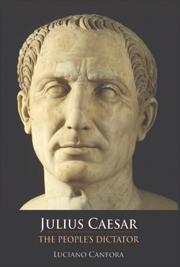Book contents
- Frontmatter
- Contents
- Translators' Note
- Acknowledgements
- Foreword
- PART I FROM SULLA TO CATILINE
- PART II FROM THE TRIUMVIRATE TO THE CONQUEST OF GAUL
- 9 The ‘Three-Headed Monster’
- 10 The Consequences of the Triumvirate: The View of Asinius Pollio
- 11 The First Consulship (59 BC)
- 12 An Inconvenient Ally: Clodius
- 13 Semiramis in Gaul
- 14 The Conquest of Gaul (58–51 BC)
- 15 The Black Book of the Gallic Campaign
- PART III THE LONG CIVIL WAR
- PART IV FROM THE CONSPIRACY TO THE TRIUMPH OF CAESARISM
- Chronology
- Bibliography
- Index
11 - The First Consulship (59 BC)
from PART II - FROM THE TRIUMVIRATE TO THE CONQUEST OF GAUL
Published online by Cambridge University Press: 05 August 2013
- Frontmatter
- Contents
- Translators' Note
- Acknowledgements
- Foreword
- PART I FROM SULLA TO CATILINE
- PART II FROM THE TRIUMVIRATE TO THE CONQUEST OF GAUL
- 9 The ‘Three-Headed Monster’
- 10 The Consequences of the Triumvirate: The View of Asinius Pollio
- 11 The First Consulship (59 BC)
- 12 An Inconvenient Ally: Clodius
- 13 Semiramis in Gaul
- 14 The Conquest of Gaul (58–51 BC)
- 15 The Black Book of the Gallic Campaign
- PART III THE LONG CIVIL WAR
- PART IV FROM THE CONSPIRACY TO THE TRIUMPH OF CAESARISM
- Chronology
- Bibliography
- Index
Summary
Caesar's first act as consul was to enact a law requiring publication of a written record of the Senate's proceedings, as well as the minutes of proceedings in the popular assemblies (the comitia). The aim was clearly to step up the external pressure on the Senate. Years later, Augustus repealed Caesar's law on the publication of Senate proceedings. Here Caesar was clearly influenced by the Greek democratic tradition, which was firmly wedded to the public use of writing. Alert to symbolism, Caesar required the lictors to walk behind him even in the months in which his fellow-consul took precedence. It was usual for the lictors, bearing the fasces and axes as tokens of office, to walk in front of the consul when he appeared in public, and in alternate months each of the consuls would assume this potent symbol of power. An ancient custom, revived by Caesar, permitted each consul, in the month in which his colleague held the tokens of office, to be followed by the lictors rather than preceded by them. In the course of the year, however, this alternation soon lost its significance. The break with Bibulus, the other consul elected by the factio, was irreparable and so dramatic that Bibulus locked himself away in his house, issuing edicts as harsh as they were impotent against his colleague, while Caesar effectively acted as sole consul, without him.
- Type
- Chapter
- Information
- Julius CaesarThe People's Dictator, pp. 78 - 82Publisher: Edinburgh University PressPrint publication year: 2007



